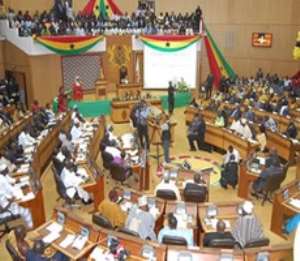
Majority leader, Cletus Avorka has ridiculed suggestions that as per the provisions of Article 117 of the 1992 Constitution, Members of Parliament are immune from arrest.
According to him, a Member of Parliament can be arrested if indeed there are clear indications that he is involved in an offence that is detrimental to the functions of Parliament and to the well being of the nation.
Speaking on Multi TV's current affairs programme, pm: EXPRESS, Mr. Avorka indicated that there was the need to differentiate between a criminal and a civil offence an MP might be said to have committed.
A civil offence he said should not inhibit an MP's work indicating that when an MP is served with an arrest warrant in a civil suit, he can easily contract a lawyer to look into the matter for him whiles he goes about his parliamentary business.
The Majority leader however indicated that when the issues are criminal in nature, then the MP is liable to arrest since his actions might jeopardise the integrity of Parliament.
He also noted that an MP can be arrested whiles on private business but added that it behoves on the security agencies to determine whether the MP was on private business or not as well as explain the conditions leading to his/her arrest.
Minority leader, Osei Kyei Mensah Bonsu, who was also on the show explained the origin of the famous Article 117 which states “civil or criminal process coming from any court or place out of Parliament shall not be served on or executed in relation to the Speaker or Member or Clerk of Parliament whiles he is on his way to attending at or returning from any proceedings of Parliament”.
According to him, the provision originated from the United Kingdom and was meant to protect MPs in the dispensation of their duties.
He explained that when an MP is arrested in the course of discharging Parliamentary business, the constituency he or she represents is denied participation in Parliament and to a larger extent, the people's right to vote on issues on the floor of Parliament is denied.
He added that “constituency business is Parliamentary business, so an MP who is in his constituency, meeting with the people cannot be arrested since he is meeting with the people he is representing, thus conducting parliamentary business”.
Citing Article 122 of the 1992 Constitution to support his claim, Mr. Mensah Bonsu stressed the need for a clear cut provision which will require that the Speaker of Parliament is informed by the security agency of their intentions to arrest an MP, so that the work of the Parliament will not be impeded by the MP's arrest.
He further suggested the setting up of an ad-hoc committee to clearly spell out the terms and conditions under which a Member of Parliament can be arrested.
Both leaders however indicated that the work of Parliamentarians was beyond the plenary sittings of the house and thus included, committee meetings, group discussions and trips and that any effort to arrest an MP whiles on official duty should be made in consultation with the leadership of the House.




 2024 election: Don’t be scared; we're ready to maintain law and order – Dampare ...
2024 election: Don’t be scared; we're ready to maintain law and order – Dampare ...
 NDC to officially outdoor Prof Jane Naana as 2024 running mate on April 24
NDC to officially outdoor Prof Jane Naana as 2024 running mate on April 24
 Power outages: Always give 3 days prior notice — PURC to ECG
Power outages: Always give 3 days prior notice — PURC to ECG
 NDC's quest to wrestle power from NPP goes beyond partisanship; it’s a national ...
NDC's quest to wrestle power from NPP goes beyond partisanship; it’s a national ...
 ECG board members slapped GHS5.8 million fine by PURC for failing to alert publi...
ECG board members slapped GHS5.8 million fine by PURC for failing to alert publi...
 I never left NPP, they 'sacked' me for attending Alan's programme; even a $100mi...
I never left NPP, they 'sacked' me for attending Alan's programme; even a $100mi...
 Fuel prices go up today
Fuel prices go up today
 Anti-gay bill: Your stance serves no purpose; either you actively advocate for t...
Anti-gay bill: Your stance serves no purpose; either you actively advocate for t...
 Tension brews as NPP Seattle clashes with national leadership over parallel chap...
Tension brews as NPP Seattle clashes with national leadership over parallel chap...
 Anti-gay bill: You've done nothing in Ghana to prove you're against LGBTQ+; ther...
Anti-gay bill: You've done nothing in Ghana to prove you're against LGBTQ+; ther...
